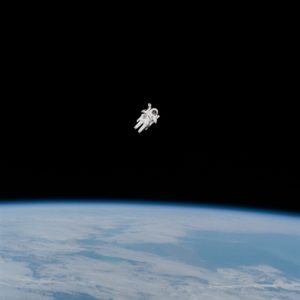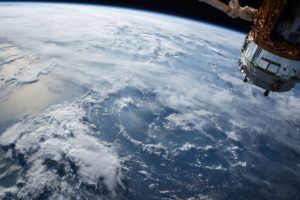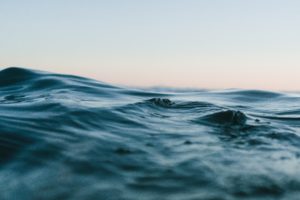In his latest op-ed in the Australian Financial Review, CSIRO’s Data61 CEO Adrian Turner argues that oceans are one of the most vital additions to the world's economy, but with plastic rubbish set to outweigh fish within decades, this valuable resource is at risk.

Nothing captures our imagination like the prospect of space travel[Link will open in a new window]. For those lucky few to experience it, their lives will never be the same. The “overview effect” is a cognitive shift in awareness reported by astronauts during spaceflight. The term was coined by author and space philosopher Frank White, who describes the phenomenon as “the experience of seeing the Earth from a distance, especially from orbit or the moon, and realising the inherent unity and oneness of everything on the planet. The viewer moves from identification with parts of the Earth to identification with the whole system.”
A former NASA space shuttle commander put it more succinctly at a recent event in Australia; “You look out one window and you see the blue marble that is Earth, you realise all countries, land and water are connected. You look out the other side of the shuttle and you just see darkness, no places anyone would want to live. It’s at that moment you realise that all of humanity are passengers on this spaceship called Earth, and we only have one.”
Nothing captures our imagination like the prospect of space travel[Link will open in a new window]. For those lucky few to experience it, their lives will never be the same. The “overview effect” is a cognitive shift in awareness reported by astronauts during spaceflight. The term was coined by author and space philosopher Frank White, who describes the phenomenon as “the experience of seeing the Earth from a distance, especially from orbit or the moon, and realising the inherent unity and oneness of everything on the planet. The viewer moves from identification with parts of the Earth to identification with the whole system.”

From photos taken of Earth from space, it’s clear to see that oceans cover 71 per cent of the Earth’s surface and contain 97 per cent of our water. Our oceans are inextricably linked to our land. While space has traditionally been dubbed the “new frontier”, we know more about the surface of the moon than we do about the floors of our oceans. Our society, environment and economy are undeniably linked to our oceans, and it’s a timely reminder of its fragility and significance.
The ocean is vital to the world’s economy, more than 90 per cent of trade[Link will open in a new window]uses sea routes. More than 3 billion people depend on marine and coastal biodiversity for their livelihoods. Globally, the market value of marine and coastal resources and industries is estimated at $3 trillion per year or about 5 per cent of global GDP. But this invaluable resource is at risk.
According to the World Economic Forum, plastic rubbish will outweigh fish in the oceans by 2050[Link will open in a new window], while 95 per cent of plastic packaging – estimated to be worth between $116 billion and $174 billion a year is lost to the economy after a single use. There is already movement by industries and nations to curtail this. In Europe, a UN decision on the EU’s Circular Economy Package[Link will open in a new window]now imposes recycling targets that are extremely ambitious. And at home, retailers such as Woolworths are committing to playing their part in reducing the use of plastic[Link will open in a new window].

The concept of the blue economy – defined by the World Bank as the sustainable use of ocean resources for economic growth, improved livelihoods, and jobs while preserving the health of ocean ecosystems – is gaining traction. Australia boasts the third largest marine estate of any country and has a huge opportunity to play a vital role in protecting and developing ocean-based industries. We’re already witnessing a growing range of ocean-related economic activities and constant innovations. This will accelerate with the use of artificial intelligence.
One current project, titled Wanda[Link will open in a new window], is the product of a research collaboration with the Australian Fisheries Management Authority (AFMA). Wanda aims to improve confidence in the fishing sector and reduce the cost of surveillance by using advanced mathematical and computing techniques such as deep learning to automatically detect and identify fish species.
